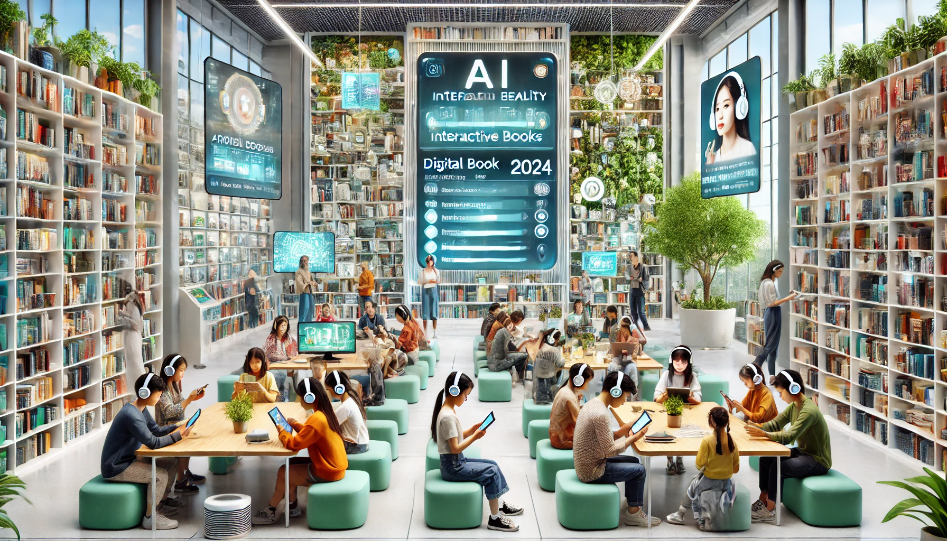The Evolution of Books in 2024: Trends, Innovations, and the Future of Reading

As we progress through 2024, the landscape of books and reading continues to evolve, influenced by technological advancements, changing reader preferences, and innovative publishing strategies. Here, we explore the key trends and innovations shaping the world of books this year and what they mean for readers and authors alike.
Digital and Audiobooks: The Dominance Continues
Digital and audiobooks have solidified their place in the market, with more readers opting for the convenience of e-readers and audio platforms. The accessibility of these formats allows readers to enjoy books on the go, making literature more integrated into daily life. Audiobooks, in particular, have seen a surge in popularity, with immersive experiences enhanced by professional narrations and soundscapes.
AI and Machine Learning in Publishing
Artificial intelligence and machine learning are transforming the publishing industry. From predictive analytics to personalized book recommendations, AI is helping publishers understand reader preferences and market trends better. AI-generated content is also becoming more sophisticated, providing tools for authors to enhance their writing and even assisting in the creation of new stories.
Interactive and Enhanced E-books
Enhanced e-books are pushing the boundaries of traditional reading experiences. These books incorporate multimedia elements such as videos, animations, and interactive graphics, creating an engaging and immersive reading experience. This trend is particularly popular in educational and children's literature, where interactive content can enhance learning and retention.
Sustainability in Publishing
Sustainability has become a crucial focus in the publishing industry. Publishers are adopting eco-friendly practices, such as using recycled paper, environmentally friendly inks, and reducing carbon footprints in distribution processes. Readers are increasingly supporting sustainable publishing, driving the industry to innovate and adopt greener practices.
Diverse and Inclusive Narratives
The demand for diverse and inclusive stories continues to grow. Readers are seeking books that reflect a variety of cultures, experiences, and perspectives. This trend is not only enriching the literary landscape but also providing opportunities for underrepresented voices to be heard. Publishers are actively seeking diverse authors and stories to meet this demand.
Community-Driven Platforms
Community-driven platforms are becoming a cornerstone of the reading ecosystem. Websites like TxtTale.com and SampleChaps.com offer spaces for writers to share their work, receive feedback, and connect with readers. These platforms foster a sense of community and collaboration, allowing authors to build their audiences organically.
Hybrid Publishing Models
Hybrid publishing models, which combine elements of traditional and self-publishing, are gaining traction. These models offer authors more control over their work while still providing access to professional editing, marketing, and distribution services. This approach is empowering more writers to bring their stories to the market.
Augmented Reality (AR) in Books
Augmented reality is making its way into the world of books, offering an interactive layer to the reading experience. AR can bring characters and scenes to life, provide additional context, and engage readers in new ways. This technology is particularly exciting for children's books and educational materials, where it can make learning more dynamic and fun. For more insights, explore The Evolution of Storytelling: Virtual and Augmented Reality VR AR in Books.
The Resurgence of Independent Bookstores
Despite the dominance of online retailers, independent bookstores are experiencing a resurgence. These stores are becoming community hubs, offering personalized recommendations, hosting author events, and creating spaces for readers to gather. The unique experiences offered by indie bookstores are proving that physical stores still have a significant role in the book industry.
The Future of Storytelling
As we look to the future, storytelling is evolving beyond the written word. Transmedia storytelling, where narratives are told across multiple platforms and formats, is becoming more prevalent. This approach allows for deeper and more expansive story worlds, engaging audiences through books, films, games, and interactive media.
Conclusion
The world of books in 2024 is vibrant and ever-changing. From technological innovations to a renewed focus on sustainability and diversity, the industry is adapting to meet the needs and desires of modern readers. As we embrace these changes, the love for stories and the written word continues to thrive, promising an exciting future for books and reading.



